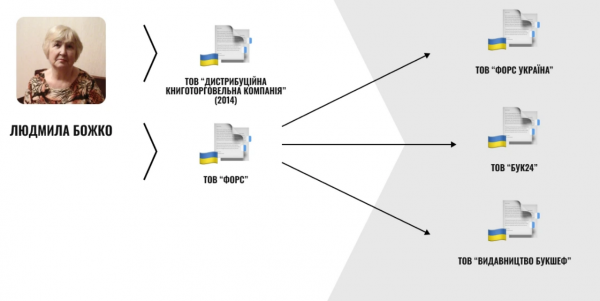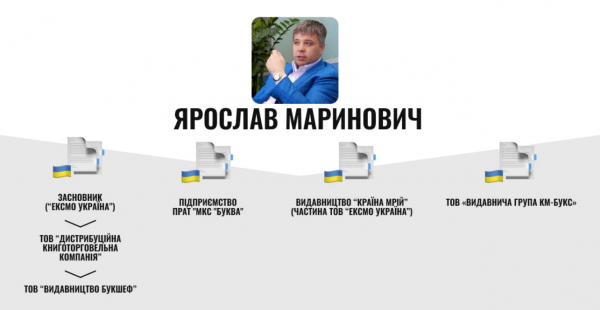Russian publishers have adapted to new conditions and began to actively open their subsidiaries in Ukraine.

Illustrative photo and communities “Molfar “conducted an investigation and found out that Russian book publishers are still making money in Ukraine.
Over the past ten years, Ukrainian publishers have been fighting hard for sunshine in the Ukrainian market. According to a study by the Ukrainian Association of Publishers and Book Distributors, published in 2013, Russian books occupied up to 75% of the Ukrainian book publishing market. Thanks to the efforts of the publishing community, the state and activists managed to gradually expand the share of domestic products – in 2021, Ukrainian book publishing already occupied 40–50% of the market.
This was partly facilitated by changes at the legal level. First of all, the State Committee for Television and Radio proposed introducing mandatory registration of books imported from Russia. In 2016, the Verkhovna Rada finally adopted this bill, according to which the import of anti-Ukrainian literature from the Russian Federation was prohibited.
To import a book from Russia, you first had to obtain permission. However, this did not apply to Russian-language books published in Ukraine. That is, the ban had a rather limited effect, although it did complicate logistics and supplies for the Russians.
Instead, Russian publishers adapted to the new conditions and began to actively open their subsidiaries in Ukraine.
Since direct import from Russia became inconvenient, Russian publishers often worked according to the following principle: pre-press preparation took place in Russia, and the Ukrainian “daughter” bought printing rights and actually acted as a printer in Ukraine, releasing books through specially registered representative offices. Russia remained the recipient of the profit, and also with lower costs for the process on its part.
Thanks to this scheme, the Russians continued their ideological expansion and flooded the Ukrainian book market. The daughters of such Russian publishing giants as Eksmo, Azbuka-Atikus and Alpina Publisher have worked successfully in Ukraine for a long time.
In the end, several bills were registered that should stimulate the publishing business and completely ban Russian imports.
In particular, in 2022, bill No. 6287 “On stimulating the development of Ukrainian book publishing and book distribution” was adopted. The innovation talks about government subsidies for publishers, as well as support for the youngest readers to publish translations.
Then the Verkhovna Rada adopted Law No. 2309-IX, which was supposed to completely ban the import of publishing products from the Russian Federation, Belarus and temporarily occupied territories. For almost a year, the law waited for the President’s signature – and thanks to the efforts of the publishing community and concerned people, it came into force on June 25, 2023.
Sensor, together with Molfar, investigated that companies with Ukrainian registration, but with Russian connections, are still operating on the market. Moreover, these publishers continue to receive grant funds from the state.
From the joint research of Sensor and the Molfar community, it can be assumed that the Russian Eksmo continues to be present in the Ukrainian book publishing market through a number of affiliated companies. It seems that the former owners of the Ukrainian branch of Eksmo still indirectly control the network of projects in which we have followed connections with Russia and the Russian Eksmo in particular. It turned out that Natalya Plekhova, the owner of one of these projects – book24.ua – even has a Russian passport and individual entrepreneur. investigation ” src=”https://baltimorechronicle.com/wp-content/uploads/2023/12/3068c05082e7fc1a40aa864142d92c09.png” alt=”Russian book publishers are still making money in Ukraine, – /p>



Ukrainian publishers have repeatedly complained about companies associated with the former Eksmo branch and its owners. However, institutions are in no hurry to react decisively while there are no violations in the legal field. We can only hope that the pressure of the publishing and reading community, as well as book distributors, will shift the lever in favor of Ukrainian interests.
